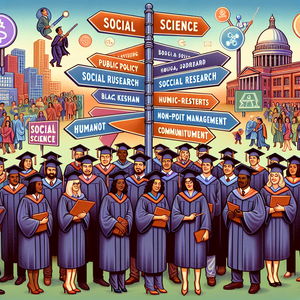
Exploring 20 Dynamic Career Paths with a Human Resources Degree: Insights, Requirements, and Future Trends
Embarking on a career in Human Resources (HR) offers a wealth of opportunities that cater to diverse interests and skills. With a degree in HR, graduates can explore a variety of roles, from essential positions such as HR Manager and Recruiter to specialized careers like Compensation Analyst and Employee Relations Specialist. HR professionals are pivotal in creating a positive workplace culture, ensuring compliance with labor regulations, and maximizing the potential of an organization’s workforce. This article serves as a thorough guide to 20 potential career avenues for HR graduates, outlining job responsibilities, educational prerequisites, and contributions to organizational success. It also incorporates relevant statistics, including job outlooks and average salaries, to provide a comprehensive overview of the HR landscape. Whether you’re contemplating a career shift or exploring post-graduation options, these insights will help you chart your course in the HR field.
Job Summaries:
HR Manager:
- HR Managers are the backbone of the human resources department.
- Tasked with fostering an environment conducive to employee development while ensuring adherence to labor laws.
- Duties encompass the creation of HR policies, overseeing recruitment, and mediating employee disputes.
- A bachelor's degree in HR or business is essential.
- Strong leadership and communication abilities are important.
- The Bureau of Labor Statistics (BLS) cites the median annual salary for HR Managers at approximately $121,220.
- Projected growth rate of 7% from 2020 to 2030.
Talent Acquisition Specialist:
- Talent Acquisition Specialists are dedicated to identifying and securing top talent for organizations.
- This role involves crafting job descriptions, conducting interviews, and collaborating with hiring managers to fulfill staffing needs.
- A degree in HR or a related field is vital, alongside exceptional negotiation and interpersonal skills.
- The average salary for Talent Acquisition Specialists is around $64,000, with job growth anticipated at 4% over the next decade.
Payroll Specialist:
- Payroll Specialists ensure the accurate processing of employee compensation.
- Handling deductions and bonuses while complying with tax regulations.
- A background in finance or accounting is typically required.
- Proficiency in payroll software is typically required.
- This role is crucial for maintaining employee satisfaction and regulatory compliance.
- Average salary is approximately $51,500.
- Stable job outlook.
Employee Relations Specialist:
- Focusing on fostering a positive workplace culture
- Manage employee interactions and address grievances
- Conduct investigations
- Mediate disputes
- Develop employee engagement strategies
- A degree in HR or psychology is beneficial
- Strong conflict-resolution skills are important
- Average salary for this position is about $66,000
- Increasing demand as companies prioritize employee well-being
Compensation and Benefits Manager:
- Compensation and Benefits Managers design and administer employee compensation structures and benefits programs.
- Their work includes analyzing market trends, ensuring compliance with labor laws, and managing payroll systems.
- A bachelor's degree in HR or finance is often required, along with strong analytical skills.
- These professionals earn an average salary of approximately $116,000, with a projected growth rate of 4%.
HR Specialist:
- HR Specialists oversee various HR functions, such as recruitment, onboarding, and performance management.
- They support HR Managers in implementing policies and ensuring compliance with regulations.
- A preferred educational background includes a bachelor's degree in HR or business, along with robust organizational skills.
- The average salary for HR Specialists is about $60,000, with steady job prospects.
Training and Development Manager:
- Responsible for creating and executing employee training programs aimed at enhancing skills and performance.
- Typically requires a degree in HR or education.
- Experience in instructional design is beneficial.
- Vital for promoting a culture of continuous learning.
- Average salary of around $115,000.
- Projected job growth rate of 7%.
Human Resources Coordinator:
- HR Coordinators manage administrative tasks
- Schedule interviews
- Maintain employee records
- A bachelor's degree in HR or a related field is often necessary
- Strong attention to detail and communication skills are important
- Essential for smooth HR operations
- Average salary of $48,000
Onboarding Specialist:
- Onboarding Specialists facilitate the new hire experience, ensuring a seamless transition into the organization.
- They coordinate orientation programs and facilitate introductions to team members.
- A background in HR is advantageous, alongside excellent interpersonal skills.
- Onboarding Specialists earn an average salary of about $53,000, with demand increasing as companies focus on employee retention.
Labor Relations Specialist:
- Labor Relations Specialists handle relationships between management and employees, particularly in unionized settings.
- They negotiate labor contracts and ensure compliance with labor laws.
- A degree in HR, law, or industrial relations is typically required.
- The average salary for this role is around $70,000, reflecting its importance in maintaining workplace balance.
Benefits Administrator:
- Benefits Administrators manage employee benefits programs, such as health insurance and retirement plans.
- They analyze benefits data and ensure regulatory compliance.
- A degree in HR or business is beneficial, with strong analytical skills being critical.
- The average salary for Benefits Administrators is approximately $61,000, with steady job growth expected.
Chief Human Resources Officer (CHRO):
- Serving as a strategic leader, the CHRO develops and implements HR strategies aligned with organizational objectives.
- This executive role oversees all HR functions and leads workforce planning initiatives.
- Typically requiring a master’s degree in HR or business, along with extensive experience.
- CHROs command an average salary of $203,000, reflecting their critical role in shaping company culture and driving success.
Recruitment Coordinator:
- Recruitment Coordinators support the hiring process by managing job postings.
- They schedule interviews and conduct background checks.
- A bachelor’s degree in HR or a related field is often required.
- Strong organizational skills are necessary for this role.
- This role is essential for ensuring an efficient recruitment process.
- The average salary for this position is about $52,000.
Organizational Development Specialist:
- Focusing on enhancing organizational effectiveness.
- Organizational Development Specialists work on training, change management, and performance improvement initiatives.
- A degree in HR or organizational psychology is often required.
- Strong analytical skills are crucial.
- The average salary is around $84,000.
- There is growing demand as companies strive for enhanced performance.
HR Information Systems Analyst:
- HRIS Analysts manage and analyze data related to employee information and HR processes.
- Ensuring effective use of HR software and maintaining data integrity.
- A degree in IT, business, or HR is typically required.
- The average salary for HRIS Analysts is about $78,000.
- Job growth rate is 9%.
Diversity and Inclusion Officer:
- Diversity and Inclusion Officers are responsible for developing strategies that promote workplace diversity.
- Their duties include conducting training and assessing company culture.
- A degree in HR or social sciences is preferred, requiring strong interpersonal skills.
- The average salary for this role is approximately $85,000, reflecting the increasing focus on diversity in workplaces.
Health and Safety Coordinator:
- Health and Safety Coordinators develop and implement policies to ensure a safe working environment.
- Conducting training sessions and ensuring compliance with safety regulations.
- A degree in HR or safety management is typically required.
- This role is crucial for safeguarding employee well-being.
- Average salary of around $71,000.
Employee Engagement Specialist:
- Employee Engagement Specialists work to enhance engagement levels through surveys and feedback mechanisms.
- They recommend improvements based on assessments of employee satisfaction.
- A degree in HR or psychology is beneficial for this role.
- Strong analytical skills are required for success in this position.
- The average salary for this role is about $65,000.
- This role emphasizes the importance of employee morale.
HR Business Partner:
- HR Business Partners collaborate with management to align HR strategies with business objectives.
- They provide guidance on talent management and employee relations.
- A bachelor’s degree in HR or business is often required.
- Strong strategic thinking skills are critical.
- The average salary for HR Business Partners is around $92,000.
- There is steady demand for HR Business Partners as organizations seek strategic alignment.
Learning and Development Coordinator:
- Learning and Development Coordinators design and execute training programs to enhance employee skills and knowledge.
- A degree in HR or education is typically required.
- Strong communication skills are necessary for this role.
- This role is essential for cultivating a culture of continuous learning.
- The average salary for this position is approximately $71,000.
- The projected growth rate for this role is 8%.
The field of Human Resources presents a diverse array of career opportunities, each offering the potential for growth and personal development. The various roles available not only cater to a wide range of interests and skills but also play a pivotal role in shaping an organization’s culture and success. By understanding the responsibilities, requirements, and compensation associated with each position, you can make informed decisions about your career path in HR. Whether you aspire to begin as an HR Coordinator or aim for the position of Chief Human Resources Officer, the HR sector is rich with opportunities for those armed with the right knowledge and skills. Explore current job openings and take that next step in your HR journey!
Explore More Jobs

